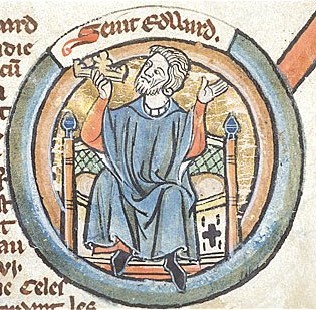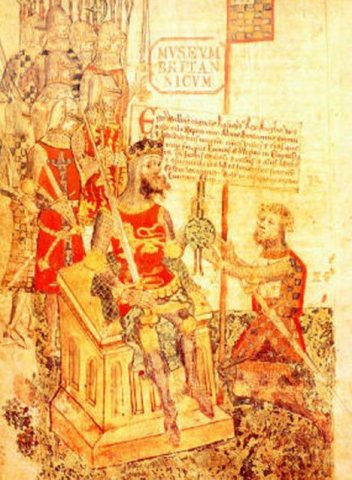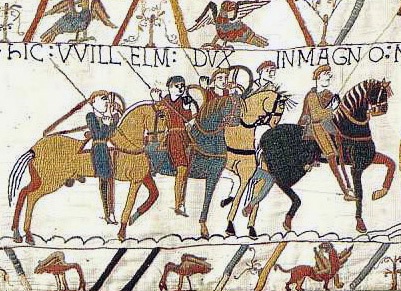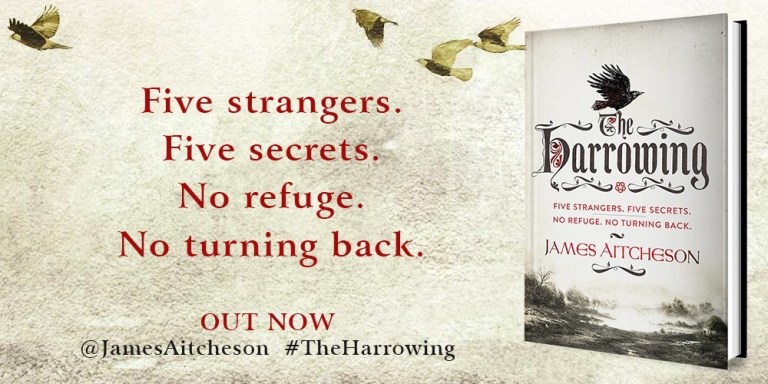Fact vs Fiction by David Churchill

One of the constant issues one deals with as a writer of historical fiction, particularly when it’s set in a region of northern Europe that was only just emerging from the Dark Ages, is the degree to which one has to be true to the facts. The problem is there aren’t very many facts to be true to. Of course this is also an opportunity, as it leaves a tremendous amount of room for one’s imagination.
Still, I am constantly alert to the danger of writing something that might cause an expert – actual or simply self-proclaimed – to point out that I’ve got some crucial incident completely wrong, or say that I’ve falsely traduced the memory of a particular man or woman. Since one of the men about whom I am rudest in the Leopards of Normandy trilogy, King Edward the Confessor of England, actually became a saint, this is a very real possibility. This is a problem for even the greatest writers. Shakespeare portrayed Richard III as a cruel and homicidal villain, causing centuries of pain to those say he was nothing of the kind. Hilary Mantel has been accused of making the Thomas Cromwell of Wolf Hall a sympathetic figure when he was actually, say the experts, a ruthless political schemer.
But so what? The whole point about fiction is that it’s… er… fictitious. You want history? Try the history section. Over here, we’re in the business of telling stories. Of course I try to do my research and master my subject. But once the writing begins, the story and its characters make their own demands and my overwhelming concern is to try and make their narratives work as a book, not to stick to some supposedly true and definitive account of actual events.
So, for example, Lady Godiva appears in Duke because I’d have to be crazy to write at length about her husband, Leofric of Mercia, about whom very few people know, but leave out Godiva, who’s been a household name for centuries. On the other hand, it became clear to me that if I left the main plot of Duke to devote a chapter or two to Godiva’s equestrian striptease act then I’d put a brake on the overall narrative and distract readers from the main thrust of the story. My solution was to set a scene between Leofric and his fellow magnate, Godwin of Essex, in Coventry, to introduce the idea of Godiva and later in the book have Godwin tease Leofric about what she has done. So it’s noted, but not to the extent that harms the book.
Other scenes, however, were just too good to ignore. The festering sense of betrayal that Edward the Confessor-to-be feels towards his mother, Emma of Normandy, runs through both Devil and now Duke. That Edward hated his mother is plain from the way he treated her after he became king, doing all that he could to humble and impoverish her. I think this bitterness coloured his relations, such as they were, with women in general. Edward was capable of behaving very coldly, even cruelly towards his wife, Edith of Wessex, and his apparent refusal to have any kind of normal married relations with her, or any other women strikes me – with my cynical, modern mind – as less a sign of chastity and virtue than misogyny and impotence.
To put it bluntly, I don’t like the man, whereas I have a great deal of admiration for his mother. So when I can across the story where Edward had accused his mother of having an affair with a bishop and sentenced her to a trial by ordeal, which she had triumphantly survived, I absolutely wanted to use the yarn, and the fact that it was a much later piece of medieval myth-making was neither here nor there. The only way in which I changed the original account was that it told of how Emma walked unscathed across burning ploughshares. It is stretching credulity too far to believe that anyone could walk across sharp-edged, red-hot iron – then again, that’s the point of the original story: it’s supposed to be a miracle. But it would be possible for a woman to amaze the watching crowds – and herself – by walking across a bed of glowing coals. So my tale is a compromise. I use a story that may not be true, but tell it in such a way that it does not seem inconceivable. Even fiction has to have some connection with reality.
David Churchill’s Duke is out in paperback






